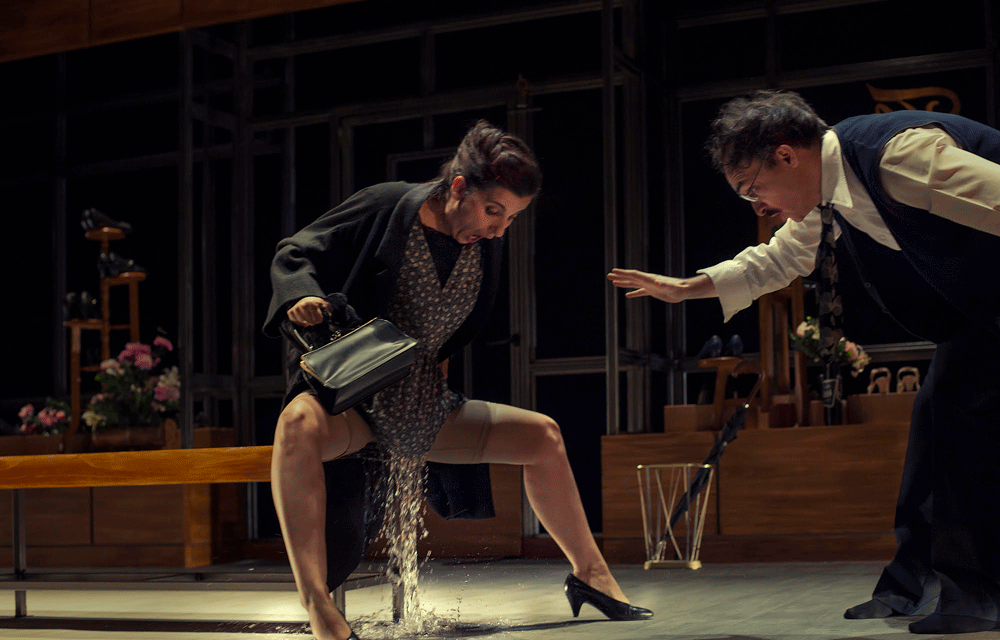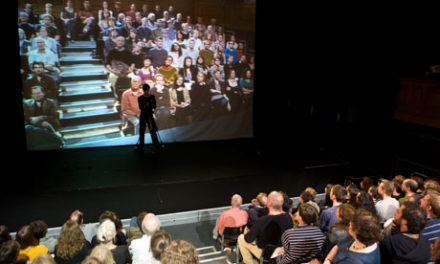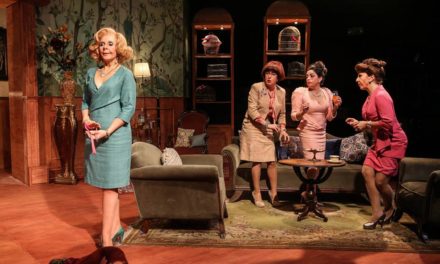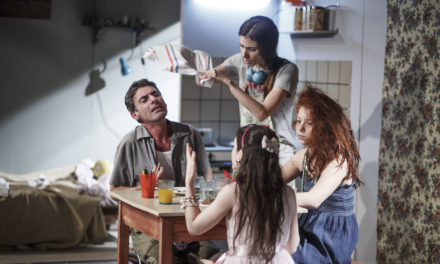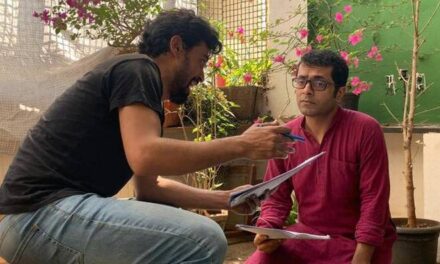Continta me tienes, the Spanish publishing house, sent us the volume The Words of the Plays, featuring four full-length plays and four short texts by the theatre director, playwright, and actor Pablo Messiez. Messiez was born in 1974 in Buenos Aires, Argentina, and he has been working mainly in Spanish theatre. Last year he won a MAX award, the main national award, as a theatre director, and this season he has been commissioned to lead a production from the Spanish National Theatre.

The eyes (Los ojos)> Picture by Javier Naval
The plays featured in the book are Muda (Mute), Los ojos (The Eyes), Las plantas (The Plants), and Todo el tiempo del mundo (All the Time in the World).
Mute premiered at the Teatro Pradillo in Madrid, Spain, in 2010, directed by Pablo Messiez himself; with Marianela Pensado as Ana, the mute one and new tenant in the building; Óscar Velado as the suicidal building manager; and Fernanda Orazi as Flor, the upstairs neighbour. The play opens with the building manager about to commit suicide in the room in which the play is set—there are no more spaces; we don’t need them. The three characters share a tremendous need to communicate and to bond with other human beings, but one of them has a couple of secrets up her/his sleeve.
The Eyes premiered at the Fernán Gómez Theatre in Madrid, Spain, in 2011, directed by Messiez; with Óscar Velado as Pablo, Marianela Pensado as Nela, Fernanda Orazi as Natalia, and Violeta Pérez as Chabuca. The text is based on the novel Marianela, by Benito Pérez Galdós, and it tells the story of Marianela, a girl with an ugly face, and her love for Pablo, a blind boy, who also has romantic feelings for Nela.
https://www.youtube.com/watch?v=6gXGrAoFOhU?rel=0
The Plants premiered at the Conde Duque in Madrid in 2012, directed by Messiez and with Estefanía de los Santos as Alicia. It is a monologue to the plants that Alicia has in her house. You can watch the whole play in its original Spanish version in the video below:
And then we get to All the Time in the World, the main dish in this theatrical banquet. It premiered at the Palacio Valdés in Avilés, Spain, in 2016, with Carlota Gaviño as Client and Doroty, Rebeca Hernando as Client and Aurora, Javier Lara as The Man who came with the Rain, María Morales as Nené, José Juan Rodríguez as Anelo, Íñigo Rodríguez-Claro as Héctor Flores, and Mikele Urroz as Amelia. All the Time in the World is a play about Flores (as Messiez’s grandfather), who owns a ladies’ shoe store. Flores has been working there with Nené for years, and their relationship resembles love. But even though love is present in the story, it is not its main engine. Each night, as Flores closes the shoe store, he is visited by different characters, each of whom tells him his future or reveals things about his present and even about his past. At first these are only stories, but then the characters establish themselves in the scenes as a reality, until the point at which Flores receives a visit from his own mother and witnesses his own birth.
The whole book is a delight. One of the best things you could say about a play is that it makes you want to listen to what the characters have to say: it makes you want to spend time with them and get to know them, even the characters who are not represented in the play but are just mentioned. Messiez’s are not big characters—kings, rulers, or any kind of powerful people—nor are they stereotypes; they are sweet everyday people thinking and feeling and valuing the proper things. Once the playwright gets us invested in his characters, he delivers a beautiful story that makes the experience fully enchanting.
Ty Burrell, the actor who plays Phil Dunphy on the American TV show Modern Family, said, “It’s like going on vacation to play Phil. His brain is like a meadow. His brain is like those sound machines you get for the bedside table. It’s like the sound of waves crashing, like a babbling brook and wind in the trees.”
That’s the feeling you get when you read and imagine Messiez’s plays. They are a little window into the little lives of everyday people who, at the end of the day, are just like us. Messiez makes us both assume and enjoy the realisation that we are all as insignificant as his characters, and that is comforting because these little characters matter. They matter to someone within the play and to you as a reader and as an audience member.
We recommend this book to anyone able to read Spanish and, from here, we also encourage theatre translators to have a go at it; email the publishing house at escenicas@contintametienes.com.
This post was written by the author in their personal capacity.The opinions expressed in this article are the author’s own and do not reflect the view of The Theatre Times, their staff or collaborators.
This post was written by Beatriz Cabur.
The views expressed here belong to the author and do not necessarily reflect our views and opinions.

